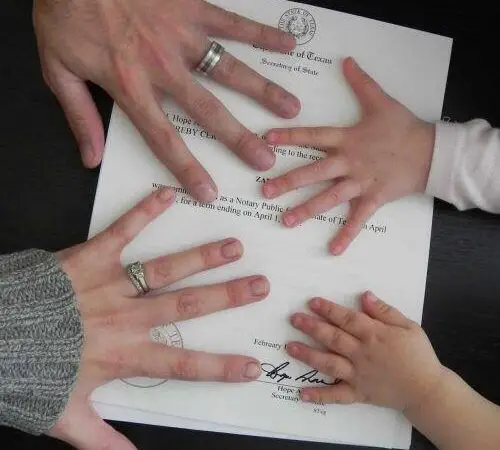Interstate Adoption
If you are adopting a child out of state, it’s critical that you understand and meet interstate adoption laws. We can help!
After you are Certified to Adopt, you may adopt a child from anywhere in the country. When you adopt a child from another state, the adoption must comply with the Interstate Compact for the Placement of Children, or ICPC. All 50 states, the District of Columbia, and the Virgin Islands have enacted this compact.
Before a child born in one state can travel to another state for the purpose of adoption, you must receive approval from both the sending state and the receiving state. State requirements differ regarding the documents that must be submitted to the state’s ICPC administrator.
It is important that you are represented by an attorney, like Kristy or Cory from Stuart & Blackwell, who knows each state’s requirements. The compact administrator for Arizona ICPC will not give approval for a child to come to Arizona unless the adopting parents are Certified as Acceptable to Adopt by our Court and a copy of their home study and court order certifying them is submitted to the ICPC.
The ICPC process cannot start until the birth parents have signed their consents for the adoption and the baby and birth mom have both been discharged from the hospital. From that point, the interstate adoption process can take 3-14 days. If you are adopting a child from another state, you should plan to stay in the sending state for 2 weeks.
Many adopting parents report that having a newborn in a hotel room is very difficult due to the small space and lack of amenities (such as a stove, microwave, refrigerator, rocking chair, etc.). Many recommend renting an apartment or house, if possible.
Birth Fathers’ Rights in Arizona
According to Arizona law, there are three catrgories of fathers when it comes to adoption. It’s critically important that you understand the father’s rights.
Potential Father
A potential father is a man who is not married to the expectant mother and who has been identified by her as a possible biological father.
All potential fathers must be served with a Potential Father’s Notice. This Notice can be served on him during or after the pregnancy. It notifies him of his rights and if he fails to take the necessary proactive actions within 30 days of being served with the Notice, his consent for the adoption is no longer needed.
Putative Father
A putative father is a man who is not married to the expectant mother and has not been identified by her as a possible biological father.
If an unidentified father (“Putative Father”) fails to register with the Putative Father’s Registry in the State of Arizona within 30 days of the child’s birth (or if it was not possible for him to register within 30 days of the child’s birth, then within 30 days of when it became possible), his consent for the adoption is no longer needed. His lack of knowledge of a pregnancy is not an excuse. The intimate act that resulted in the pregnancy is his notice.
Presumed Legal Father
A presumed legal father is a man who is married to the expectant mother (even if he is not the biological father) or a man who has been listed as the father of the child on the birth certificate (even if he is not the biological father). A presumed legal father must consent to the adoption or have his rights terminated by the Court. The Potential Father’s Notice and the Putative Father’s Registry cannot be used to terminate his rights.
Adoption Finalization

Everyone needs to go to a court hearing to finalize an adoption. In Arizona, you can finalize your adoption in the Juvenile Division of the Superior Court. The Court typically holds your final adoption hearing within 60-90 days. The hearing is generally 10-15 minutes long and most judges and commissioners allow you to take photos in the courtroom at the end of the proceedings.
Before the final hearing, the court must receive your post placement social study recommending the adoption. The agency that conducted your initial home study that was used to obtain the Certification to Adopt usually prepares this document. This social study focuses on how you are bonding with your child and meeting the baby’s needs.
Following the final court proceedings, you receive a certified copy of the Order of Adoption. After the adoption is completed, the court sends information about you and the child to the vital records office in the state where the child was born. That office creates a new birth certificate with the child’s new name and you listed as the child’s parent. After you receive the new birth certificate, you may take that certificate and your certified copy of the Order of Adoption to the social security office to request a new social security number for your child.

